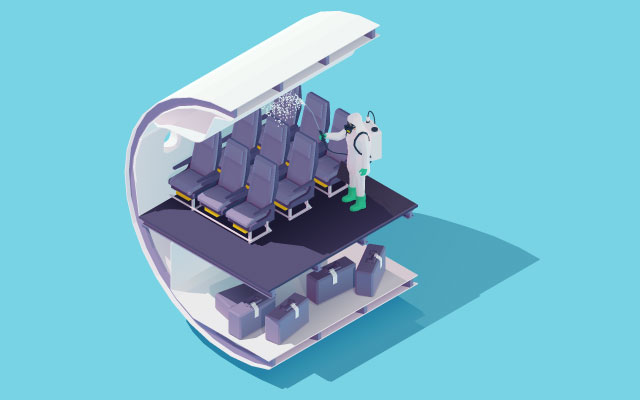Airlines are getting serious about safety and hygiene to regain travellers’ confidence.
All Nippon Airways
All Nippon Airways (ANA) has introduced vinyl curtains at check-in counters and lounge receptions. Hand sanitisers are available at self-service check-in machines and self-service baggage drop machines, while social distancing markers are in place. Machines and wheelchairs are disinfected regularly.
Passengers will be asked to pick up and scan their own boarding passes, and temperature checks are also in place at most airports. Boarding for both domestic and international flights will be according to seat, starting at the rear, from window to middle to aisle, moving to the front of the plane.
On flights, staff will wear masks and gloves. Passengers will be asked to refrain from leaving their seat and keep conversations to a minimum. Tables, armrests, TVs, controllers and toilet doorknobs will be disinfected after every international flight and after every night for domestic flights.
In ANA Lounges, food and drinks will be individually wrapped and some services will be suspended. – Kathryn Wortley

Cathay Pacific
Cathay Pacific first requires all passengers to answer health screening questions upon check-in. Passengers are also required to wear face coverings in most situations such as at security lines and baggage collection areas.
A two-metre social distancing rule is enforced by staff at check-in, during boarding, in-flight, and during disembarkation.
Onboard, quality air is ensured by HEPA filters which remove 99.9 per cent of airborne contaminants and fresh air recirculates every two minutes. Crew have to don masks, gloves and goggles, and are under strict layover orders to have no contact with the local community in destinations they travel to.
All Cathay Pacific lounges outside of Hong Kong, with the exception of Shanghai Pudong International Airport, have been closed. Those that are open have taken additional precautions by temporarily modifying dining options. – Prudence Lui
Emirates
Customers flying with the Middle Eastern airline from now until October 31, 2020, can claim medical expenses of up to €150,000 (US$174,000) and quarantine costs of €100 per day for 14 days, should they be diagnosed with Covid-19 during their travel. Applicable across all fare classes and destinations, this cover is valid for 31 days from when a passenger flies the first sector of their journey.
On the ground, chauffeur services for First Class and Business Class customers have resumed. All drivers will wear masks and gloves, and all cars will be cleaned and disinfected at the end of each shift. Upon check in, passengers will receive complimentary hygiene kits comprising masks, gloves, antibacterial wipes and hand sanitiser.
At Emirates’ lounge in Dubai International Airport, food is served in hygienically sealed meal boxes, while single-serve bottles of beverages are just some of the modified amenities to ensure safety.
All cabin crew on board will wear personal protective equipment. Magazines and printed reading material have been removed indefinitely, and comfort items such as mattresses, pillows, blankets and headphones are hygienically sealed.
Aircraft have been fitted with HEPA air filters which remove 99.9 per cent of viruses and eliminate dust, allergens and germs from cabin air. Upon arrival in Dubai, each aircraft goes through an enhanced cleaning and disinfection process. – Rachel AJ Lee
Qantas
Qantas introduced a Fly Well programme in June, which includes a range of measures such as enhanced cleaning, minimising points of contact and individual packs of sanitising wipes and masks for each passenger. Customers are sent information before their flight so they know what’s expected and are encouraged to use contactless check-in methods and self-serve bag drops.
The airline has also installed hygiene screens at airline customer service desks and made temporary changes to the Qantas Lounge which encourage social distancing.
Onboard, passengers are provided with masks, sanitising wipes to wipe down their seating area themselves as an additional measure to the airlines’ already enhanced cleaning of high-contact areas including armrests, trays, seat belts, overhead lockers and air vents. Sequenced boarding and disembarkation are also operated to minimise crowding.
Qantas’ planes are already fitted with hospital-grade HEPA filters. – Adelaine Ng
Singapore Airlines
Singapore Airlines (SIA) and its sister airlines are currently providing Care Kits that each include a surgical mask, anti-bacterial hand wipes and a hand sanitiser to all passengers.
The airline has migrated all of its seatback literature to the SingaporeAir mobile app, on which passengers can also navigate the inflight entertainment system. Crew don face masks throughout the flight, eye goggles when interacting with customers, and gloves during the now-limited meal service.
Meal services have been suspended for flights within South-east Asia and services to China. These are replaced by snack bags. On longhaul flights, a single tray service has been introduced in First Class and Business Class in place of a table layout service.
Every aircraft under the SIA Group undergoes fogging procedures that follow regulatory requirements; as well as a wipe-down using strong approved disinfectant of common surfaces and areas. Reusable amenities, like headrests and pillows, are also washed and replaced after every flight.
Aircraft are equipped with HEPA filters, while almost all lavatories in SIA aircraft feature contactless faucets and have anti-bacterial hand wash. SIA is also trialling an ultra-violet light cleaning procedure for its lavatories before every flight.
At SilverKris Lounges, cleaning procedures have been stepped up, and customers now order meals from a menu instead of picking off a buffet line. – Pamela Chow





















